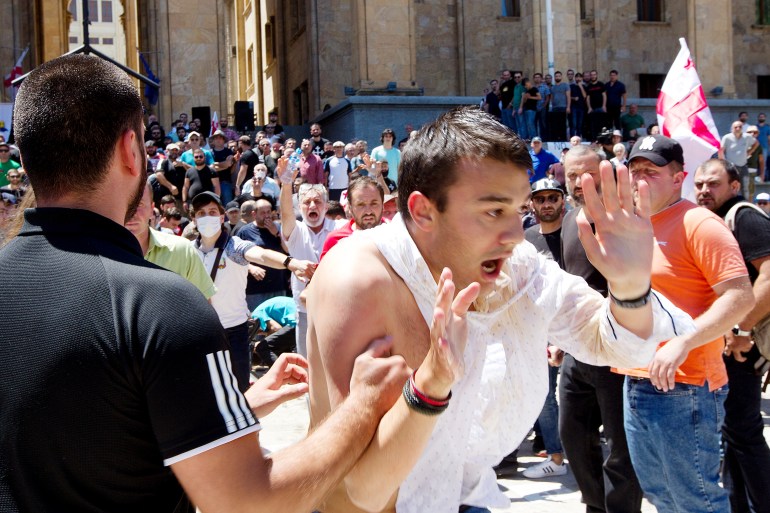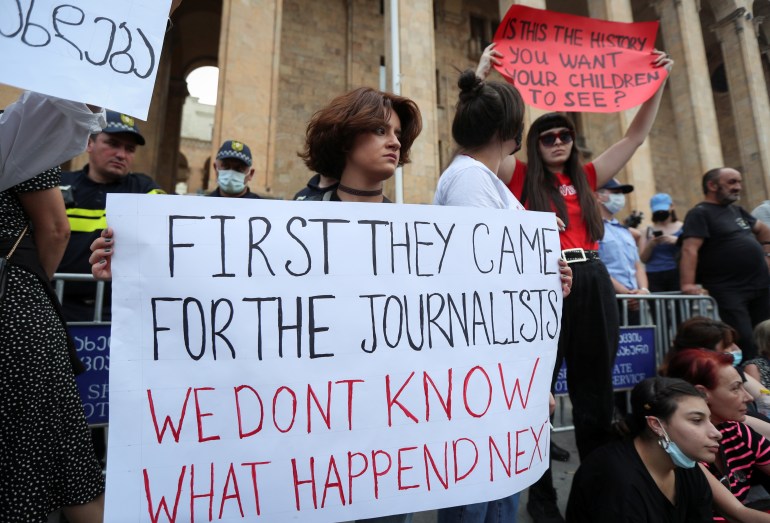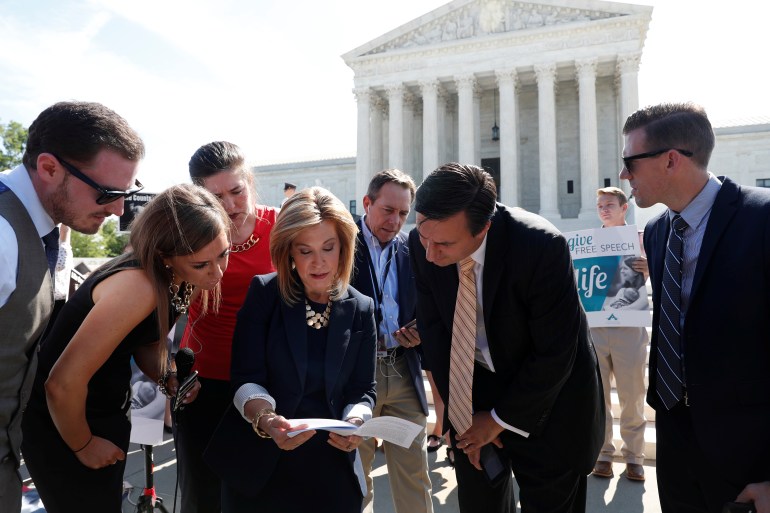The war on gender: An unholy east-west crusade | The Far Right
Tbilisi, Georgia – Ultraconservative forces in the United States no longer have a friend in the White House, but their efforts to undermine democracy and human rights in Europe have maintained momentum, in partnership with like-minded wealthy European and Russian religious ideologues.
Rights defenders tasked with defending Europe’s values say the strategy and tactics of international illiberalism are just beginning to be understood.
They have identified a powerful international network of ultraconservative groups backed by a cast of wealthy American, European and Russian financiers working within the European Union and countries on its eastern fringe, including Georgia in the South Caucasus.
In Georgia’s capital Tbilisi, far-right violence exploded on the streets last year, leading to dozens of people being hurt.
Members of Georgia’s LGBTQ community had promised to hold a “March of Dignity” on July 5, but had been warned by the authorities that the police would not be able to guarantee their protection.
 A protest against a planned LGBTQ march in Tbilisi turned violent on July 5 as demonstrators attacked journalists [File: Shakh Aivazov/AP Photo]
A protest against a planned LGBTQ march in Tbilisi turned violent on July 5 as demonstrators attacked journalists [File: Shakh Aivazov/AP Photo]Alt-Info, one of Georgia’s most vocal far-right organisations, called for a counterrally in central Tbilisi.
When a crowd gathered outside the country’s parliament, Alt-Info’s Zurab Makharadze urged them: “If necessary, we will shed blood and make these f*ggots’ mothers weep.”
Protesters were directed to go in search of LGBTQ activists, but they then turned on journalists, many of whom were working for liberal and opposition media.
At least 53 people were injured (PDF), including cameraman Aleksandre Lashkarava who suffered fractures to his skull and a concussion.
Lashkarava’s colleague claimed the assault lasted 20 minutes. He died a week later from what the authorities claimed was a heroin overdose. That is disputed by his family.
In any case, as their supporters tore down the flag of the EU and bolted a massive iron cross to the steps of the country’s parliament, the organisers, who had not shrunk from calling for outright violence, had a stark underlying message: Georgian Orthodox Christian values are incompatible with European democracy and human rights.
 Activists hold posters during a rally in memory of Pirveli TV channel cameraman Alexander Lashkarava [File: Irakli Gedenidze/Reuters]
Activists hold posters during a rally in memory of Pirveli TV channel cameraman Alexander Lashkarava [File: Irakli Gedenidze/Reuters]‘Orbanisation’
The Alt-Info leadership stood side by side with priests from Georgia’s Orthodox Church. But they also shared the stage with a poster of Hungary’s Prime Minister Viktor Orbán of Hungary, where anti-LGBTQ legislation has been introduced.
While Georgia’s far-right experience has its own distinctive national characteristics, its international associations are also clear.
Nino Gozalishvili, who studies the far right in Georgia, told Al Jazeera that active groups such as Alt-Info, Georgian March, and Georgian Idea have always proudly associated themselves with their European and North American counterparts.
“Their social media pages are loaded with references to and examples from the politics of leaders such as Orbán, [former US President Donald] Trump, or [Poland’s governing party leader Jaroslaw] Kaczyński, adopting or echoing the language, political style, and at times even the protest content from the more successful European and North American cases,” she said.
But the transnational dimension runs deeper than being merely an identification with far-right politicians in Europe and the US.
 Georgian religious protesters take part in the anti-LGBTQ rally in Tbilisi [File: Zurab Kurtsikidze/EPA]
Georgian religious protesters take part in the anti-LGBTQ rally in Tbilisi [File: Zurab Kurtsikidze/EPA]Georgian groups are being nurtured within, and are drawing inspiration from, an international ultraconservative network of advocacy groups.
A formative moment came back in 2016, when Tbilisi hosted the World Congress of Families, an umbrella network promoting anti-abortion and anti-gay policies.
Levan Vasadze, a leading Georgian businessman and far-right campaigner, played host.
“The West de facto lost Georgia when it attacked our traditional society roots and cultural fabric,” he said in his keynote address, while the goal of Western-sponsored NGOs was to “mock and demonise traditional family values”.
At the event, Georgian religious conservatives mingled with leading Russian and US advocates, including Alexey Komov who works for the St Basil Foundation headed by a far-right Kremlin-linked Russian oligarch, Konstantin Malofeev, and Douglas Napier from one of the US’s most powerful Christian Right legal advocacy groups, the Alliance for Defending Freedom (ADF).
US rights watchdog the Southern Poverty Law Center lists the ADF as a hate group.
Overlapping group of actors
Regular forums and conferences are attended by directors and associates of different US, European and Russian conservative and far-right organisations, some of whom are members of each other’s boards.
“You have the same overlapping group of actors present at international and at European level also in the US and other parts of the world,” Neil Datta, the secretary of the European Parliamentary Forum for Sexual and Reproductive Rights (EPF), told Al Jazeera.
The EPF, a network of pro-rights European parliamentarians, claims Christian religious extremists from the US, Russia and Europe have been working to roll back human rights in Europe since 2013 through a coordinating platform known as Agenda Europe (PDF).
Their “anti-gender movement” focuses its attacks on five interrelated sets:
- Sexual and reproductive health and rights including abortion, contraception, divorce and assisted reproduction
- LGBTQ rights
- The definition of gender as a non-biological, cultural construct
- Children’s rights and the state’s authority to determine the welfare of a child over parents
- Elevating religious freedom to be a higher order of human rights than others such as the right to abortion and sexual orientation
“These themes come under attack depending on the circumstances and cultural preferences of a given country,” Datta said. “Then you have local actors nationally who are the ones who run with it when the moment is right.”
If LGBTQ rights are the target in Georgia, in other countries, the anti-gender movement has zeroed in on sexual and reproductive health, and the groundbreaking European legal instrument known as the Istanbul Convention.
Established by Europe’s leading human rights organisation, the Council of Europe, the Istanbul Convention sets legally-binding standards to fight gender-based violence, in particular violence against women.
In Strasbourg, Brussels and other European capitals, the ADF’s international arm – the ADFI – is fighting to curtail rights legislation protecting women and the LGBTQ community.
 The Alliance Defending Freedom lawyers read the decision outside the US Supreme Court after the court struck down a California law requiring clinics that counsel women against abortion to notify clients of the availability of abortions paid for by the state [File: Leah Millis/Reuters]
The Alliance Defending Freedom lawyers read the decision outside the US Supreme Court after the court struck down a California law requiring clinics that counsel women against abortion to notify clients of the availability of abortions paid for by the state [File: Leah Millis/Reuters]ADFI boasts an army of more than 2,100 Christian lawyers trained in strategic litigation, working to change laws in European countries on issues such as the definition of marriage and abortion.
In Poland, ADFI has close links to the ultraconservative religious organisation Ordo Iuris Institute for Legal Culture.
Together, Ordo Iuris and ADFI successfully lobbied for Poland to change its law on abortion. Two former members of Ordo Iuris are now part of Poland’s Supreme Court.
“They changed the way the judges are appointed, gave much more power to the government and Law and Justice party. The judicial system isn’t entirely broken but predominantly their goal was to get the judiciary in line with a socially conservative movement,” Wendy Via, the head of the Global Project Against Hate and Extremism (GPAHE), told Al Jazeera.
GPAHE has tracked the work of ADFI across Europe, where it frequently participates in cases at the European Court of Human Rights, including supporting Macedonia and Bulgaria against the rights of transgender people, backing Austrian discrimination against same-sex couples seeking to adopt, and defending a devout Christian family who refused to send their children to school in Germany.
“They lost in Germany, but they don’t mind losing, because everything they do draws attention. You keep pushing narrative change then you win the next one,” Via said.
ADFI’s accomplishments
Some of the key accomplishments of the ADFI have been the successful lobbying of Council of Europe member states to back away from the Istanbul Convention, which it claims codifies “non-binary definitions of gender and takes away the rights of the family”.
Bulgaria’s Constitutional Court ruled against the Convention in 2018. Legislators in Slovakia voted against ratifying it the following year. Hungary’s parliament approved a declaration against ratifying the Istanbul Convention in 2020.
Even Poland which ratified the Istanbul Convention back in 2015 has seen efforts to undermine it. The legality of the Convention in Poland is currently under review by its Constitutional Court.
Daniel Milo, a Slovakia-based security analyst, told Al Jazeera that the coordinated strategy by the international far right has taken shape in less than 10 years.
“I see significant pushback about gender equality, women’s rights and gay rights led by ultraconservative forces. This debate just wasn’t present until ’17 and ’18 when suddenly out of the blue we see a well-organised effort jumping from one country to another,” he said.
“Suddenly there were books being published across the region, exposing an alleged conspiracy of the left to change the natural laws of men and women, creating these artificial genders and gender ideology, which is now present in the public discourse. It’s been remarkable how successful it’s been,” Milo said.
Fightback?
The Council of Europe has expressed concern about how to deal with the attack, whether to engage the false narratives or by doing so risk elevating them.
“It’s only in 2021 that they’re asking themselves where did this contestation come from and what we can do about it. Simply they were like an animal in an ecosystem and they’re not equipped to deal with that predator,” Datta of the EPF said.
The EPF has identified $707m spent between 2009 and 2018 (PDF) by NGOs and conservative think-tanks from the US, oligarchs and government agencies from Russia, and private foundations and transnational NGO alliances in Europe.
With those resources, the anti-gender movement has been able to score significant victories, says Milo.
“In Eastern Europe, the liberal momentum has been stopped and in some cases rolled back. Overall the tone of discussion when it comes not only to gender or LGBTQ but also migration and EU expansion is very different to what it was. They managed to change the main narrative and political discourse.”
In Georgia, progress made in strengthening human rights has been commended by the Council of Europe. Georgia is among the Council’s 35 member states to have ratified or acceded to the Convention, and has been touted by the Council as having taken exemplary first steps to implement it.
 Georgians march to mark the Day of Unity and Holiness of the Family – the holiday established by the Georgian Orthodox Church in 2014 as a counterweight to a gay pride march [File: Shakh Aivazov/AP Photo]
Georgians march to mark the Day of Unity and Holiness of the Family – the holiday established by the Georgian Orthodox Church in 2014 as a counterweight to a gay pride march [File: Shakh Aivazov/AP Photo]So far, the far right has not focussed their attacks on the Istanbul Convention in Georgia, targeting the LGBTQ community instead, with the full support of the Georgian Orthodox Church. And to date, the government has failed to prosecute any of the organisers of last year’s violence.
Instead, in comments made on July 12, Georgia’s Prime Minister Irakli Garibashvili, suggested most Georgians supported the attacks.
“I know just one parade, this is the parade of our army that will be held in our country. When 95 percent of our population is against holding a demonstratively propagandistic march or parade, we should all obey it,” he said.
For Datta, the anti-gender movement still remains relatively unrecognised as a united front.
“It’s a new force in democratic societies and not everyone understands what it is, or how to neutralise it,” he said.
“People take a look at the anti-Istanbul Convention stuff, and think it’s a problem they’re facing. The LGBTQ community think they’re facing homophobia, women think they’re facing misogyny … but it’s all inter-related, symptoms of the same problem,” Datta added.
“We still have to reach a state where we have a common understanding of the same problem. That’s the first step.”

Pingback: 7 slots
Pingback: Diyala University in iraq